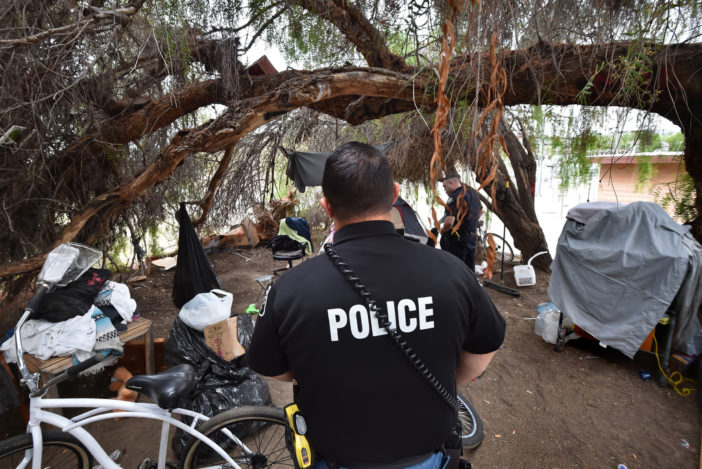There is little doubt the issues regarding homelessness are on the rise.
It doesn’t take much effort to look around and see the problems communities are facing. From the 16th Street mall in Denver, Colo., to Skid Row in Los Angeles, to the Civic Center in Santa Ana, homeless issues are at the forefront of community concerns.
The increased presence of homeless in city parks and public facilities has, at times, rendered them unusable and unsafe for families.
Riverbeds, freeway right-of-ways and flood control channels have become encampments for large populations of homeless.
With the complications related to homelessness, has also come the public expectation that law enforcement will somehow fix their parks, clean their streets and make their communities feel safe again.
It has been my experience police officers, generally speaking, have no issues with the homeless. Being poor, out of work and falling on tough times is not a crime. Laws against vagrancy have not existed in decades.
However, the public demands police officers maintain public order and ensure their safety.
It’s not that homeless people are the problem. It is homeless behavior.
Aggressive panhandling involving threatening language, and public intoxication either on drugs or alcohol is not acceptable. Trespassing on private property and the occupation of public right-of-ways is against the law. There also is a myriad of criminal offenses that have to be dealt with.
Then there are the mentally ill, whose disruptive behavior can become criminal.
When the behavior gets bad enough, 911 becomes the answer.
And the public expects the problem to be dealt with immediately.
But handling homeless issues has become a case of darned if you do and darned if you don’t.
Laws are passed to deal with illegal camping in public places. Attempts to enforce these laws are met with widespread criticism and media coverage.
Maintaining public order and safety has its limits.
Either way, the police are made out to be the bad guys.
Homeless outreach officers, in partnership with public and private organizations, have had some success. These officers spend a great deal of time connecting and attempting to address the individual needs of the people they encounter. It can take weeks, months or even years to find the best approach to get someone off the streets.
I have watched as homeless outreach officers have celebrated a successful effort.
These police officers want to help people.
But what do you do when a large percentage of the homeless don’t want help or are not ready to accept it? In speaking with police officers whose full time job is homeless outreach, there is a consensus: A significant number of homeless won’t accept services when offered.
There is no simple answer to the issue of homelessness. That should not keep policy makers from addressing it. It’s not just about safer, more livable communities. It’s the right thing to do.
The lack of adequate shelters, readily available treatment programs and long term institutional care are public policy issues.
This often leaves police officers caught in the middle. A large part of the community expects the laws to be enforced and they have no patience for any delay.
Another part of the community wants the problem of homelessness addressed with sensitivity and long-term success. This takes time and resources.
As always, police officers end up getting caught up in the middle.
 Behind the Badge
Behind the Badge



